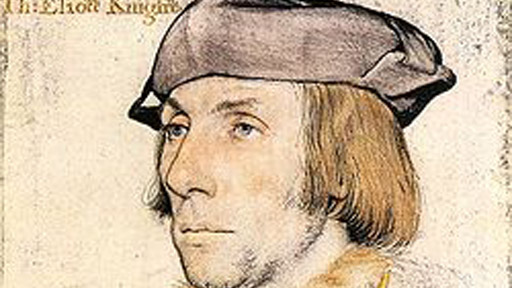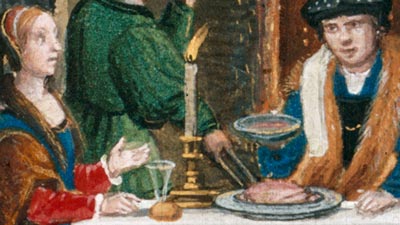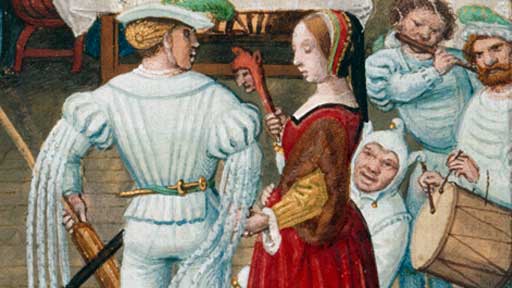The historical context pages consist of excerpts either from contemporaneous Tudor texts (both literary and historical), or the Chaucerian heritage from which Heywood draws, as well as a selection of historical images. Featuring these excerpts and images is designed to illuminate the literary context of each of the ten scenes of The Play of the Weather, as well as the political, social and theatrical representations contained within them.
The Assemble of goddes |
|
 |
Attributed to John Lydgate c.1500 this dream-vision allegory is highly reminiscent of Jupiter's opening speech in The Play of the Weather. |
Lists of Places in Early Modern Drama |
|
 |
The listing of places (as Merry Report does shortly after his appointment as Jupiter's servant), is a common feature of fifteenth and early sixteenth-century English Drama. Presented here are two examples from Heywood's The Four PP and the anonymous Play of the Sacrament. |
Sir Thomas Elyot on the Education of Aristocratic Children from The Book Named The Governor (1531) |
|
 |
A detailed discussion on how to be a good nobleman and ruler from an explicitly humanist perspective. |
Description of a Merchant from the General Prologue to The Canterbury Tales |
|
 |
A useful depiction of this emergent class. |
Account of May Day revels, 1515 |
|
 |
Edward Hall's records the spontaneous nature of celebratory performances and something of the reciprocity between inside and outside the court. |
Extract on Candles from The Eltham Ordinances |
|
 |
16th century court reform at its most bureaucratic, The Eltham Ordinances even attempt to control the fate of spent candles. |
The Miller from the General Prologue to The Canterbury Tales |
|
 |
The description of The Miller from The Canterbury Tales, connecting Chaucer's parodic representation of social types to the estate satire of Heywood. |
Widow Edith |
|
 |
A witty misogynistic piece reflecting a tension found in a number of early Tudor representations of strong females. as well as a celebration of female resourcefulness and wit. |
The Tunning of Elinor Rumming |
|
 |
This poem by John Skelton provides useful insight into the representation of ageing women who run their own businesses during the early sixteenth century. |
Guystarde and Sygysmonde on Idleness |
|
 |
Whilst this is a conventional piece of Tudor chivalric poetry, Robert Copland’s preface to the translator is noticeable because it presents the poem as a moral tale rather then emphasising the courtly aspect. |
Instructions for ‘Porters at the Gate’ |
|
 |
A series of instructions contained in The Eltham Ordinances of 1526 for those employed as ‘Porters at the Gate’ at the court, revealing the structure and bureaucratic nature of the Henrician court. |
The Amicable Grant, 1525 |
|
 |
An account of the events surrounding the Amicable Grant 1525 from Hall's Chronicle. The Amicable Grant was an attempt by Henry and Wolsey to raise non-parliamentary taxation under the guise of a ‘gift’ from the populace to the King. |
Greenwich Revels - Lodovico Spinelli's Account |
|
 |
In his account of the revels Lodovico Spinelli comments in particular on the seating of the audience, according to rank and gender, for the performance of the drama Love and Riches. He also remarks on the degree of order and silence with which the Greenwich revels were conducted. |
Account of the entertainment for the French Ambassadors, 1518 |
|
 |
An account from Hall's Chronicle that describes a courtly pageant performed in 1518 - a theatrical spectacle to celebrate the betrothal of Princess Mary to the Dauphin of France. |












